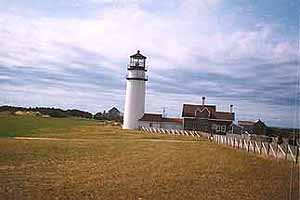| Babylon
makes a call at historic Highland |
There aren't all
that many figures of "olde Cape Cod" remaining these days,
as the modern world, or "Babylon," as many in the literary
world refer to it, has begun to slowly engulf the area that Thoreau
called "a wild, rank place," during his famous hikes on the
Great Outer Beach during the mid-1800s.
One of those reminders of "olde Cape Cod" is Highland Light
in Truro, the oldest light house on Cape Cod and a treasure chest for
New England historians.
|
During his
stay here a century and a half ago, Thoreau noted in his book
"Cape Cod" that "a man may stand here and put all
of America behind him." Several decades later, another budding
author named Henry Beston also came here as a guest of lightkeepers
George and Mary Smith. "Instead of going to sleep under the
eaves, I would lie awake, looking out of a window to the great
spokes of light revolving as solemnly as a part of the universe,"
wrote the man who would go on to pen the classic Cape Cod literary
masterpiece "The Outermost House."
|
 Don
by the Sea
Don
by the Sea
By Don Wilding |
|
Yet, nothing is
sacred these days, and the painful reality of that hit me harder than
a potent winter nor'easter during a recent visit to the historic Truro
lighthouse.
I had paid visits to the site before, but never entered any of the buildings.
This was due to the fact that it was off-season, or that I had only
a few minutes to take in the scenery here before hurrying off to return
home, which is over 100 miles away. This time, I made up my mind to
visit the museum and then take the tour up into the inner confines of
the lighthouse.
About a dozen or so of us had lined up at the lighthouse entrance for
the tour, and after a brief history lesson, were guided up to the very
top. There is was -- Provincetown could be seen through the haze just
to the northwest, and another marker facing the wide open Atlantic indicated
that Portugal was some 5,000 miles away to the east.
The spiraling light, now electric, still moved about. The lighthouse
was no longer the saviour for ships at sea that it was once was, but
still a critical part of the Outer Cape landscape.
As our guide filled us in on more history and answered questions, the
modern world made its usual rude interruption to any resemblance of
the simple life that once existed here.
"Riiiiiiiinnnng!! Riiiiiiiiinnnnnng!!"
A middle-aged man, clad in typical tourist garb, reached for his pocket.
"Hello? Oh, yeah -- we're at the lighthouse. You should see the
golf course here. One of the oldest in America. Blah, blah, blah ..."
It was the curse of the cell phone. It's bad enough to hear that annoying
shriek of its ring when you're waiting in line at the supermarket ...
sitting in the stands at a baseball game ... waiting patiently to be
the next patient at the doctor's office ... or just about ANYWHERE these
days, for that matter.
But HERE? At Highland Light? One of the few reminders of "olde
Cape Cod?" That seemed downright sacriligious, in the eyes of this
Cape Cod nature literature enthusiast.
No one said anything after his two-minute conversation, but that little
modern day interruption put a huge damper on the whole experience. Could
you imagine Thoreau or Beston taking a call on a cell phone in a place
like this?
Reaching out on another branch of modern day "Babylon," I
would think they would have a similar reaction to the guy on the Corona
TV commercial -- the one who's skipping stones into the tropical lagoon
while he's relaxing with his lemon-soaked Mexican brew. The pager goes
off, and into the gentle surf it goes with the flat stones.
I can think of many of us who would have the same reaction.
"It is well to use the wheel but it is fatal to be bound to it,"
Beston wrote in "Northern Farm." We are all becoming more
and more bound to modern conveniences such as cell phones, e-mail and
other electronic gadgetry. They can be downright addicting, and are
an awful lot like coffee, alcohol and other "pleasures" of
human life -- you really can get "too much of a good thing."
Perhaps heading out to places like Highland Light for a little interaction
with the natural world is the type of thing all of us could use a little
more of.
But, please -- leave the cell phone at home -- or next time, I just
might want to blend it with the natural world -- by throwing it into
the ocean.
Filed June 25, 2000
Don
by the Sea archives

|

